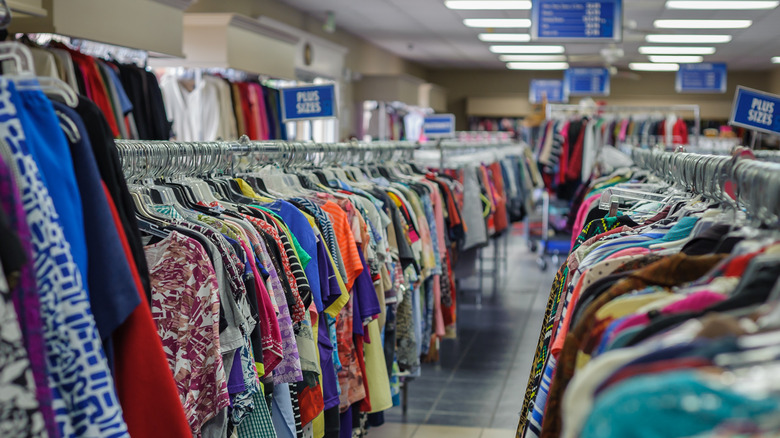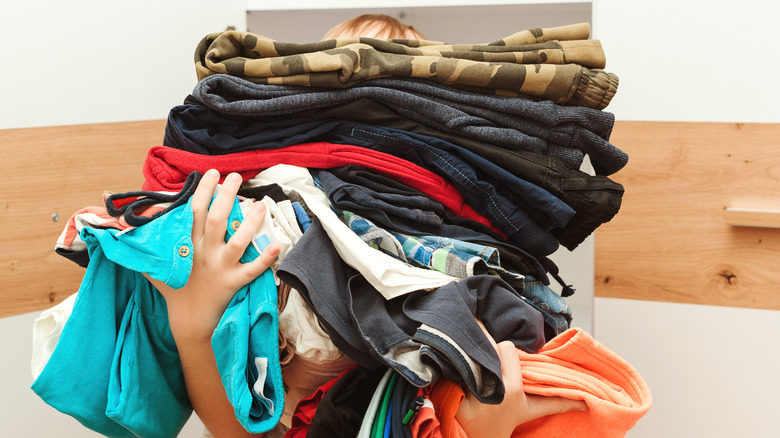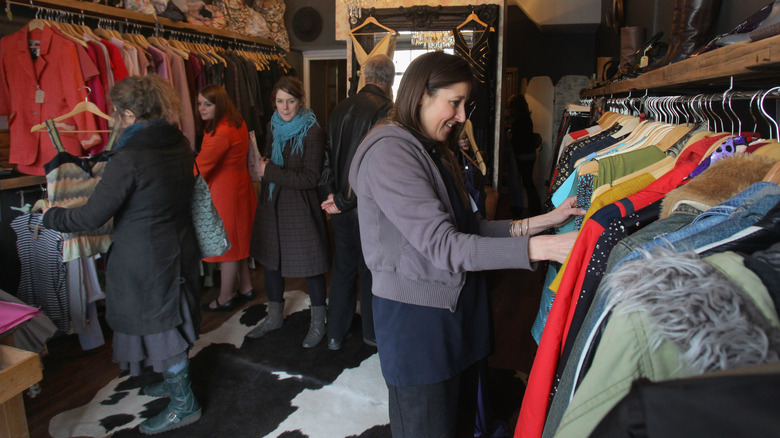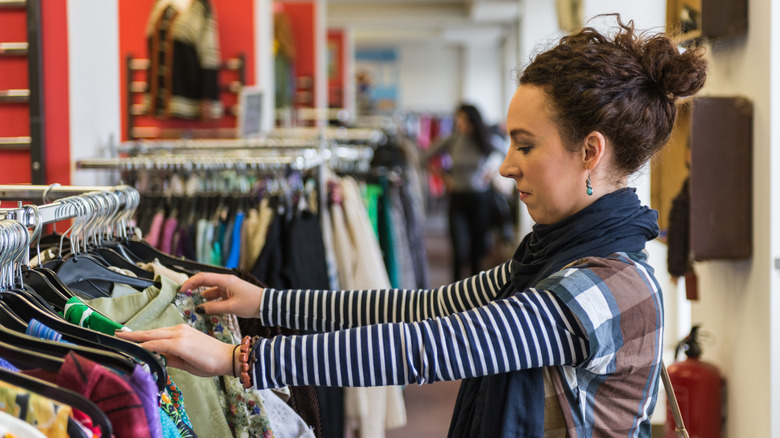How To Thrift Thoughtfully, As Shopping At Goodwill Is More Complicated Than You May Realize
At first glance, thrift store shopping seems like a win for everyone. We're saving something from a landfill and getting it at a better price than we would pay brand new. But the deeper we dig, the more complicated secondhand shopping can be. If we have larger disposable incomes, are we taking items from those who need them more? Does the rising popularity of unique secondhand garments mean that those spaces are becoming gentrified? Those aren't the only concerns about thrift stores, either. Old items can contain lead, and recalled items can often wind their way onto thrift store shelves, meaning we might unknowingly be bringing dangerous things into our homes. Other items, like plush toys, can be dirty and difficult to clean. Clearly, thrift store shopping requires careful consideration on all fronts.
There's also an ongoing debate on social media about resellers: people who scour thrift stores for quality finds and then mark up their items for a profit. Some claim that this is unethical because resellers are taking choice items away from those who need them and would enjoy the pieces themselves. But the counterargument is that these resellers are often people who are supporting themselves through talented curation of thrift store finds, and finding ways to give a second life to discarded items. Even if we shop at thrift stores for ourselves, there are some basic quandaries we have to face, like the epidemic of overconsumption, that need to be looked at. So how can we enjoy thrifting but still be thoughtful about how we shop?
Be aware of personal overconsumption
Thrift stores can lead to a lackadaisical relationship with shopping. If we purchase something, be it new or second-hand, there can be ambivalence about making careful choices since we can always donate it if we don't end up wearing it. That way, we tell ourselves, we're passing on the garment to someone else who needs it. Does the existence of thrift stores make us more casual about shopping?
The truth is that there's a glut of clothing in the world, so much so that about 80% of thrift store donations are resold in bulk to countries like Chile and Ghana, where some of the clothing is re-used, and the rest is recycled into fiber. The concept is known as waste colonialism, where privileged nations have such an excess of clothing that they use developing nations as their dumping grounds. In Accra, the capital of Ghana, 20 acres of city-center property has been claimed as land used to deal with western over-consumption.
With this as a sobering reality, how much we shop is a crucial question, even if we thrift. It can be tempting to over-purchase at thrift stores since we can justify our purchases by telling ourselves that the clothing is second-hand, but the truth is, many of us buy more than we need. The best thing to do for the environment is to use, repair, and enjoy what we already own. With that in mind, thrifting is a good choice when we legitimately do need an item we don't have.
How to deal with thrift store gentrification
Thrift store shopping begs the very pressing question: Is it ethical for us to shop at thrift stores if we can afford to shop elsewhere? The concern is that we're taking away clothing from people who need to shop second-hand and inflating prices by popular demand. British Vogue asked this very question and pointed out a significant caveat to this concern. Most charity stores operate in order to raise money for their specific causes. Providing affordable clothing is secondary. It's also their task to price their wares with an eye on market prices and with the goal of raising money, so in this light, shopping at thrift stores actually supports these causes.
"Everything we do in the stores, we raise money for programs that we operate, so we take it very [personally]," Amy Stacey, vice president of retail operations for Volunteers of America of Ohio & Indiana, told Today. "We are taking the merchandise and creating funds to help people in the community." There are separate organizations that exist to provide free clothing to families in need.
Nevertheless, people in need still frequent thrift stores. Student Anna Fitzpatrick told Popular Science that it's worth pausing in a thrift store and asking, who else shops here? If we can afford it, shopping at boutique vintage stores is a better way to get a cultivated look while supporting a local business and leaving the more economically priced clothing for those who need it.
The real problem is fast fashion, not resellers
Much of the recent controversy around thrift store shopping has been aimed at resellers who mark up thrift store items on sites like Depop and Poshmark. However, at least from a sustainability standpoint, this isn't as controversial as some people online are making it out to be. If someone has a knack for digging through piles of clothing and coming up with treasures, then compensating themselves for their labor, they're simply being mindful of their own economic needs and making discarded garments usable again. Sustainable fashion expert Lynda Grose told Popular Science, "Keeping garments in circulation longer, and all of the natural elements embedded in those garments out there for longer, is the best thing we can do." Grose added, "It makes sense to have those garments looped around a second, third, fourth, or fifth owner with the idea of slowing that extraction down."
The real enemy in ecological shopping is fast fashion and the anger directed at individual resellers online is largely misdirected. One reseller who went by the name of Sora told Vox, "I wish there were more constructive conversations about buying from Amazon or fast-fashion retailers like H&M and Shein, so it's frustrating to see all this anger directed at resellers, who are mostly young women trying to start a business." So if you're debating between purchasing an item from a reseller or an item from a fast fashion chain, always go with the reseller.



